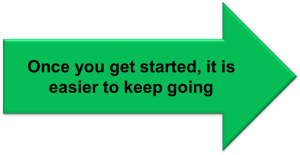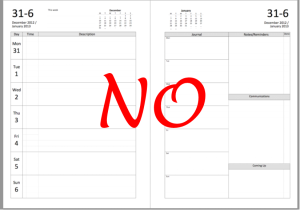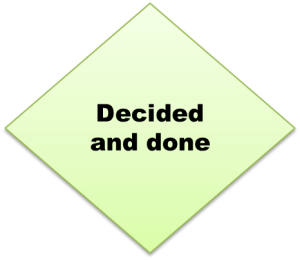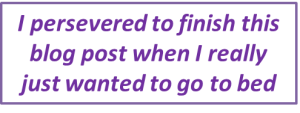Archive for December, 2014
Why I’m Not Planning For The Year Ahead and Using My Three Best Productivity Tips Instead
 Each December and January I receive dozens of emails from productivity experts, and coaches and authors who write books about how to achieve your goals. They each recommend a system for setting goals for the new year ahead.
Each December and January I receive dozens of emails from productivity experts, and coaches and authors who write books about how to achieve your goals. They each recommend a system for setting goals for the new year ahead.
Last year I sifted through these choices and decided to use a comprehensive Word document planner. As I wrote my answers to the questions provided, I listed the focus areas of my life, my values, what I care about, how I want to feel and the skills I enjoy using. Then I made a table in my word document and listed my goals in the first column. Then I matched each of the other areas that I’d identified (values, what I care about, etc) with that particular goal.
Then I identified how I use each hour of the day vs. how I want to use each hour of the day, how I will work towards achieving my goals in each month of the year, and on and on. The entire document was eight pages. I was very serious about it, and it took me three days to complete it.
 And then I never looked at it again until I opened the file to start writing this blog post.
And then I never looked at it again until I opened the file to start writing this blog post.
Almost immediately after I completed the planning document, I regretted that I wasted three days planning out my year instead of getting to work on the projects that I already know are most important to me. I didn’t need to list them on paper.
As I look back at the year that has past, that planning document didn’t help me at all.
Most of my goals turned out just fine. I launched my consulting company and am happy with the results of my first year in business. I took care of my health and my relationships. I launched my blog.
However my biggest goal was also my greatest challenge throughout the year: editing my book and preparing it for publication. The challenges are that it takes intense focus, a block of time to get my head into the work, energy and alertness, and what is often the toughest part: making my way to my office chair to open the document and get to work. Although I worked on it throughout the year, I’m frustrated that I still don’t have an agent-ready manuscript.
This year I am not filling out any annual planning worksheets or setting goals beyond using the best techniques that helped me move my book forward.
In order of the success I had with them, my tips for achieving goals are:
- Creating the smallest habit possible and then committing to repeating it every single day no matter what. For me, this was opening my word document and editing one sentence every day. Making the commitment was enough, but I sometimes used “The Chain Habit”, where you mark on a calendar each day that you complete your goal.
- Allowing other people to push you forward. This isn’t always pleasant. It can feel a little like bullying. But nudges from other people got me to reach out to the one editor that I wanted to work with. She accepted my project and I was thrilled with her edits and suggestions.
- Using self-talk to motivate yourself. Most of us learned in science class that a body in motion is likely to stay in motion and a body at rest is likely to stay at rest. So when I feel inertia, I tell myself that I just have to get started by opening my word doc. Once I get started, everything will be easier.
Whether you enjoy creating detailed plans for the year ahead or reject the whole concept, I wish you the best of luck in achieving your goals this year.
You Don’t Need Permission to Rest
You don’t need permission to rest.
You don’t need permission from someone else to take a break. You don’t need to wait for your boss, your spouse or your friends to tell you that you are allowed to have some time to take care of yourself.
You don’t have to earn your right to rest. It is a human need. Remember that babies sleep a lot and nobody questions whether they deserve it.
Self-care is a buzzword lately, but what exactly does that mean? There is no self-care prescription, such as “soak in a bubble bath one hour before bed.” Maybe you hate baths or don’t even have a bathtub.
Only you know what will give you the rest and rejuvenation that you need. For some people that might be getting an extra hour or two of sleep each night for the next few months. For others, it could be taking walks every day. Different people might make a point to go to the gym, get acupuncture, spend more time with friends, or spend more time alone. If you don’t know what you need, start by asking yourself “What is the kindest thing I can do for myself today?”
If you’re overworked, burned out, sick, stressed or need a break from coworkers and family, take it. If other people are counting on your participation in certain activities, negotiate up front. Agree to deliver the presentation your manager wants by the end of the day, and then be clear that you won’t be online or checking mail for the next week while you’re out on vacation. Tell your friends you’ll meet them for dinner but need to leave the restaurant by 8PM. Participate and enjoy the people you’re with with you’re with them. Then leave the office or the dinner with friends when you’re tired.
If there are household chores to do, or extended family staying at your house for an extended period of time, agree upfront what will be done when, and by whom. Then let everyone know when you’ll be out of the house to go exercise, or that you need two hours of alone time to nap in your room.
Whatever it is that you need to shed stress and fatigue, do it. You don’t need permission to rest.
Choose Your People
Seth Godin recently posted a blog asking business people to consider what kind of customers they want. He expanded that to include other people like backers, members, and vendors and had a list of adjectives ranging from loyal to litigious.
The same thinking can be applied to any relationship. Focusing on business:
- What kinds of coworkers do you want to collaborate with?
- What kind of manager do you want to take direction from – or what kind of employees do you want to delegate to?
- What kind of company leaders are you willing to align yourself with?
Listing adjectives is a great way to identify what is important to you about the people you will interact with in business. Work satisfaction isn’t just about the job responsibilities, salary, location and hours. Think of how happy you can feel when you have a positive connection with the people you engage with, and how miserable you can feel when your personalities, work styles or values clash.
I think Godin’s most important point is that you have some choice and influence over the type of people you work for and with. If your management makes unreasonable demands of you, can you assert your boundaries without being punished or fired? If not, that doesn’t sound like a great place to work. As an entrepreneur, if you value signed contracts defining your scope of work and payment terms but your customers balk, maybe those aren’t the right customers for you.
To an extent, people learn how to treat you based on how you interact with them. If you put up with bad behavior, you’re teaching the offenders it is ok to treat you that way. If you react calmly and with an open mind when someone brings a conflict to you, you teach them that they can bring difficult issues to you without fearing your reaction.
Who do you want to work with? And how are you teaching them to treat you?
What I Learned About Business from Improv Acting Class
 A few months after I quit my corporate job, I signed up for an eight-week improv acting class. We met for two and half hours on Wednesday evenings at a community center where we practiced improv techniques. I realized that much of what we learned applies to business.
A few months after I quit my corporate job, I signed up for an eight-week improv acting class. We met for two and half hours on Wednesday evenings at a community center where we practiced improv techniques. I realized that much of what we learned applies to business.
Three improv lessons are especially useful:
- Yes, and
- Commit
- Know When to Exit
Yes, and
In improv, this means you go with the direction your improv partner has started in order to keep the scene going. Cooperating and adding to the foundation that your partner set is what builds the story line and keeps the momentum going.
In business, if you were taught best practices in brainstorming sessions, you have already learned this. What it means is that when someone makes a suggestion, you say “yes” and then add your idea about how to make it even better. That way, whether you think their idea has merit or not, you’re keeping the positive flow of ideas coming and contributing in a positive way.
Commit
 In improv, once you enter the scene as a space alien coming to kidnap Santa Claus, you talk and act like a space alien on a mission to get Santa. If you get embarrassed and limp through your scene, it isn’t going to be enjoyable for you or the audience. If you decide you don’t want to be a space alien and try to change to something else, then you’re screwing up the scene for your partner who is playing Santa.
In improv, once you enter the scene as a space alien coming to kidnap Santa Claus, you talk and act like a space alien on a mission to get Santa. If you get embarrassed and limp through your scene, it isn’t going to be enjoyable for you or the audience. If you decide you don’t want to be a space alien and try to change to something else, then you’re screwing up the scene for your partner who is playing Santa.
In business, this boils down to deciding what your objective is, how you are going to execute upon it and then doing it. Being unclear about your objective confuses the people who need to take action. Changing tactics midway through projects wastes time and money.
Know When to Exit
In improv, sometimes an actor says a great line that is a perfect finish to the scene. The audience laughs and everyone recognizes that it’s complete. That is the time to exit and let the next scene begin fresh. Any added words or actions after that point dilutes the powerful impact that was made and it becomes less funny.
Another time to exit the scene in improv is if the scene isn’t going anywhere, it is dragging on, and the players can’t seem to fix it. The best thing to do in that case is wrap it up and move on to the next scene.
In business, there are many great applications to this lesson. You’ve won the client’s business: now shake hands and get out of their office. You’ve agreed upon next steps in the meeting: close up the laptops and get back to work. You had a great success with a product promotion that has now ended: take the lessons learned and move onto the next promotion.
And in the case of the project not going anywhere…knowing when a product or program is not viable is much more valuable than trying to force it to happen. Accept the sunk costs and move on.
This can also be applied to a job. When it becomes clear that your job is not going the way you need it to, making the decision to exit could be the best way for you to bring the scene to a close on your own terms.
Perseverance Trumps Positive Attitude
 We hear so much about how important it is to have a positive attitude. I think it is helpful to remind ourselves of what we’re grateful for because it keeps us from dwelling on what’s wrong, generally makes us feel more content with our lives, and because Oprah does it every day. Seriously! I recently went to her “Live The Life You Want” event and she credits her daily gratitude practice as part of her success.
We hear so much about how important it is to have a positive attitude. I think it is helpful to remind ourselves of what we’re grateful for because it keeps us from dwelling on what’s wrong, generally makes us feel more content with our lives, and because Oprah does it every day. Seriously! I recently went to her “Live The Life You Want” event and she credits her daily gratitude practice as part of her success.
I believe that choosing to focus on thoughts that are useful versus ones that drag us down makes sense. In my own recent experience with losing my beloved cat, consciously choosing to think that I made the best decisions possible at the end of his life has helped me cope.
I also believe there is merit to the law of attraction. Sometimes I seem to manifest whatever I’m focused on, for good or bad. I try to keep it positive so that I’ll manifest great things like my beautiful Dodge Challenger!
However, I don’t think that a positive attitude ensures we will only attract beneficial things into our lives, or that we can force our minds into thinking we’re happy when really we’re not. That would be arrogant, wouldn’t it, to think we controlled everything that happened to us!
During those times when circumstances are tough – when we’re facing a big problem, struggling with relationships or health or whatever the situation is – perseverance trumps a positive attitude. Thinking brighter thoughts might help. But perseverance is what gets us out of bed to eat and shower and get to work when we don’t feel like it. Perseverance pushes us to meet our obligations. Perseverance is what keeps us going one day after the next until we’ve made it through that tough time.



Recent Comments